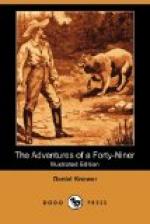When a person was attacked with it, it seemed the worst kind of malady, as it would take them months to return if they had the money to pay their passage. Many were married men, separated a great distance from their wives and children. Others, young men, who had their engaged ones waiting for them to return, with their fortunes made in the gold mines, to marry them. I can recall several instances where I have known them to lie down and die from despair. I was talking with an old Californian of those days. He said he had once given up and made up his mind to wander off by himself on the mountains and die, which he did. As he lay there in despair, after a while he thought he would look around him, and he saw the hill was covered with every variety of beautiful wild flowers. He said their beauty seemed to refresh and revive his mind, and give him new resolution, and he decided to try his fortune again, and he became successful and returned to the States with a competency.
[Illustration: THE DESPONDENT MINER.]
The early pioneers had some conflict with the Indians in the interior of the country. Five Oregon men were massacred by them when engaged in digging gold, but a terrible retribution was visited upon those Indians concerned in it by the enraged Forty-niners. The Indians, at first, had nothing but bows and arrows, and, of course, could not compete with rifles. Several other small engagements were rumored, but they soon gave up all contests with the whites, for they saw it was useless. There was an acorn that was quite plenty in California, being longer than ours, but not of a bitter taste. The squaws made flour of them. The Digger Indians were the next tribe east of them; they were probably the lowest grade. They would set fire to the prairie grass to burn the grasshoppers, and pick them up and eat them. They deemed them a luxury. The Oregon tribes were a higher grade, a warlike race, and superior in every respect. The highest grade of them, in the United States now, are the Choctaws and Chicksaws that formerly occupied the northern parts of the State of Mississippi. When a young man, I spent three weeks in their nation, travelling alone, and was treated with great hospitality by them. They are quite intelligent, and they have laws and customs as civilized nations. We generally look upon all of them as alike, but such is not the case—there is as great a difference between different tribes as much as between different white nations. The California Indians were not naturally warlike, and when the early pioneers expected any trouble from them, they would appoint a committee to go and see them, and they generally settled their difficulty without any conflicts.
JESUIT MISSION STATIONS.
There were about sixteen Jesuit missionary stations in the country before the discovery of gold, and were there for the purpose of converting the Indians to the Catholic church, and when converted, generally made them work to sustain their missionary establishments.




